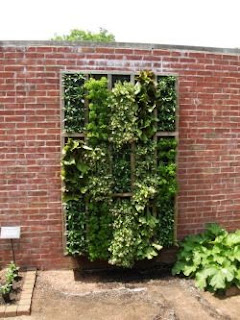With above freezing temperatures during the day for about a week, we're really getting ready for Spring. Stores are agreeing with us and starting to stock their garden centers for all of the eager gardeners. If you've ever wondered how people get their summer bulbs in the ground, today's featured article is sure to help.
HGTV Gardens goes into great details about how to get your summer bulbs going. Now is the time, so don't delay! Read the article today and then run out to get yourself some bulbs to plant!
Read the article here
Gary Chamness founded Chamness Technology, Inc (CTI), in 1986. Mr. Chamness recognized the need of commercial clients for progressive and efficient disposal of non-toxic waste. Chamness Technology has developed the expertise to solve non-hazardous waste handling problems for government, industry and agriculture. Chamness Technology is continually searching for new methods and technologies offering state-of-the-art sustainable solutions to our ever expanding customer base.
Showing posts with label summer. Show all posts
Showing posts with label summer. Show all posts
Wednesday, April 3, 2013
Wednesday, August 22, 2012
Our Top 12 Tomato Recipes
Summer is slowly creeping into fall, and with that we're getting the last of our tomato plants (hopefully grown with compost so you get the best tomatoes). However, there is no need to worry, there are plenty of great tomato recipes that also store well for the winter! Here are our top 12 tomato recipes, and a few of them you could easily save to get your tomato fix later on!
 |
| Find the Recipe Here |
 |
| Find the Recipe Here |
Here is the staple I'm sure you expected to be first on the list. This Roasted Tomato Sauce would go great with pasta or any other dish that calls for tomato sauce.
 |
| Find the Recipe Here |
 |
| Find the Recipe Here |
 |
| Find the Recipe Here |
 |
| Find the Recipe Here |
This Avocado, Tomato and Mango Salsa is a fun twist on traditional salsa and is great for the summer. Make it for your next dinner party and it's sure to please, just plan to chill it for 30 minutes before serving.
 |
| Find the Recipe Here |
 |
| Find the Recipe Here |
 |
| Find the Recipe Here |
 |
| Find the Recipe Here |
 |
| Find the Recipe Here |
 |
| Find the Recipe Here |
Do you have any favorite tomato recipes? Let us know by posting them in the comments section!
Friday, July 27, 2012
Photo Friday
Friday, July 13, 2012
Photo Friday
It's friday again, which means it's time for a new photo! This week's photo comes from nearby Webster City.
Did any of you snap a great shot today? Be sure to comment with a link to it! Have a great weekend.
Wednesday, July 11, 2012
5 Tips for starting an Urban Garden
While we mostly deal with people who have whole farms to plant, with today's urbanization it is important to realize that urban gardening and growing is possible too. Whether you're in an apartment or your house is just inside of a city, it is still possible to grow your own fresh produce. However, starting a urban garden can be somewhat daunting, so we've assembled the top five tips for starting an urban garden.
1) Evaluate your gardening space: Do you get sun exposure? Is there access to a sufficient water supply? Is there heavy traffic nearby? All of these factors can lead to success or failure in urban gardening and so it is crucial that you scope out what sort of space you'll be working with and plant accordingly. If you don't get much sun pick plants that thrive in the shade, if you don't have a hose nearby only plan enough to water with your watering can, and try to plant far away from traffic as it can cause wind and pollution that are harmful to plants.
2) Find plants that work for your space limitations: One of the big factors in urban gardening is pot or plot, how much space do you have? If you only have enough room for potted plants, make sure your plan accordingly and get plants that can flourish in pots. Some vegetables and herbs do well in pots, but some need the space to spread. Make sure you know whether yours can thrive or if it needs a bigger space.
3) Evaluate your skills and your time commitment: If you are new to gardening, perhaps it's better to go with a low maintenance, easy to grow plant. There are lists all over the web about easy things to grow as a beginner, even vegetables. If you're a gardening pro, but you don't have a ton of time to garden a lower maintenance plant is probably for you as well.
4) Know your plants before you start: Some plants like to dry between waterings, while others need constant watering to survive. Determining what your plant needs in the way of water and sun can lead to a thriving garden.
5) Make sure your landlord/city is okay with it first: creating your own garden is a great plan, but if your upset landlord kicks you out because of your green habit then it isn't something you should be doing. Make sure that your landlord and your city is okay with it, and check if you need a permit to grow in your city.
If you follow all of these tips you'll be on your way to your own urban garden!
Monday, June 25, 2012
Gardening Inspiration
In this day and age it's becoming increasingly hard to have enough room to garden everything you would like, especially in urban areas. It's due to this trend that a new gardening fashion has arose, vertical gardening. If you've been on Pinterest, there are tons of tutorials for how to make your own. Some are fairly simple:
 |
| Original Image Link |
While others can be fairly complex:
 |
| Original Image Link |
We found a few that are inspiring us to try out vertical gardening on our own, so we thought we'd share them with you as well! Enjoy our top 10 Pinterest Vertical Gardens!
 | ||||||||||||
| Original Pin We love this one because it's simple, and you can recycle old coffee tins or other old cans in the process! We also think this one would be easy to do at home.
This one is more inspiration than an easy how-to, but we love the look of making your plant life decorative, and we think these plants will definitely be getting enough light and rain!

We love this trellis style vertical garden for a bit of a different, but classic, flair.
If you want to follow us on Pinterest feel free, here's our profile.
|
Friday, June 22, 2012
Photo Friday!
This week's photo comes from our backyard- no really, it's taken right behind the corporate offices! What a relaxing view!
Has anyone else got a great view captured from right outside their window? Share the links with us if you have!
Monday, June 18, 2012
Summer DIY: Creating a nature-friendly bug repellant
It's summer time, which means we're all spending a lot more time outdoors. It also means that bugs are out in full force. The problem with commercial bug sprays is that most are made up of harmful chemicals. Making your own eco-friendly, homemade bug spray is easy, and you'll have your choice of ingredients!
The first thing you need to know about making your own bug spray is that most bugs have an aversion to many natural things. Heres a quick cheat sheet as to what certain pests dislike:
- Mosquitoes- Cinnamon Oil, Castor Oil, Lemon Eucalyptus/Eucalyptus Oil, Citronella Oil, Peppermint Oil, Lemongrass Oil
- Ticks and Lice- Lemon Eucalyptus/Eucalyptus Oil, Rose Geranium Oil
- Biting Flies- Citronella Oil
- Fleas- Orange Oil
- Stinging Insects- Lavender Oil
There are a lot of other natural oils that repel insects, but these are a few of the most effective ones.
You can also choose one of the following as a base for your natural repellant:
- Olive Oil
- Sunflower Oil
- Cooking Oil
- Witch Hazel
- Alcohol
Once you choose your ingredients, mix 10-25 drops of the essential oil(s) of your choice with 2 tbsp of your base liquid. Feel free to make a double batch or larger if you need more spray than this. Then put this mixture in a spray bottle of your choice, and voila! Homemade, nature-friendly bug repellant!
Labels:
bug,
chamness,
chamness technology,
DIY,
eco-friendly,
gardening,
green,
green ru,
greenru,
home made,
natural,
plants,
r,
repellant,
ru,
simple,
summer,
sustainability,
technology,
u
Friday, June 8, 2012
Photo Friday
Today instead of a normal blog post we decided we'd have a little fun since it's friday. This photo was taken Wednesday at our Eddyville location, and we love how peaceful it looks. Did you take any great outdoors pictures this week? If so, comment with the link!
Labels:
chamness,
chamness technology,
composting,
Eddyville,
facility,
green,
greenru,
nature,
photo,
r,
ru,
summer,
technology,
u,
water
Friday, June 1, 2012
Growing Season in full swing!
It's officially June which means that it's time to pull out that green thumb and get started working in that garden! Have some plants that just aren't looking up to snuff? Compost can help you get the most out of your summer gardening. Here's a quick list of 5 ways that compost can help your garden this summer.
1) Compost helps your soil retain water. This means that your soil has more water to feed your plants and help them develop healthy roots! Healthy roots are key to healthy plant growth, wether you're planting tomatoes or daisies.
2) Compost fights against soil contaminants for your plants. Since it's so absorbent it keeps harmful pesticides and chemicals in your soil from reaching your plants. It also works to degrade these contaminants over time.
3) Compost also helps out the critters in the soil that help your plants. Adding compost to your garden feeds organic matter to micro and macro organisms that will then feed beneficial nutrients to your plants. It also attracts earthworms, who in turn also help your soil. This is just one more thing that makes your plants healthier and your garden more bountiful.
4)If you're in an area with more clay based soil, compost will do wonders! Plants that have never been able to survive due to lack of moisture will thrive. Compost works itself into the clay sediment and helps to release water throughout it, without over saturating your soil and not allowing it drain or under saturating it and letting it grow hard and unable to aerate.
5) Composting is completely natural. That means that you're not introducing chemicals to your plants, as you would with pesticides and some fertilizers. Compost is a natural, organic product. It actually helps your soil in the long run, rather than temporarily fixing a problem, but then causing greater problems in the long run.
We hope your gardens flourish this summer, and we know that with the help of compost they definitely will!
Subscribe to:
Posts (Atom)



















